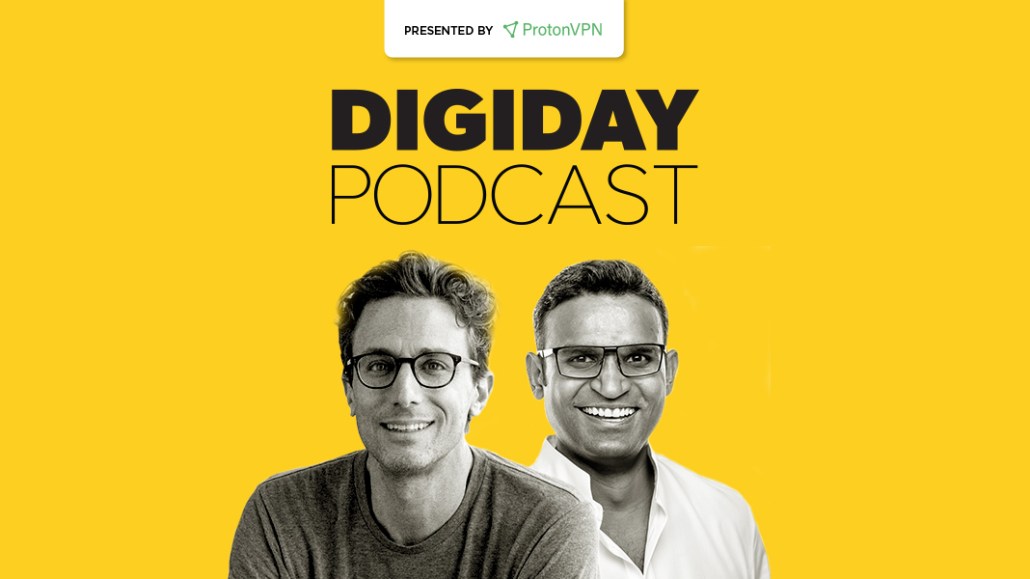Secure your place at the Digiday Media Buying Summit in Nashville, March 2-4
‘Profitability in the back half of next year’: BuzzFeed CEO Jonah Peretti (and Verizon Media CEO Guru Gowrappan) on their big merger

Subscribe: Apple Podcasts | Stitcher | Google Play | Spotify
Two of digital media’s biggest players are merging into one, with the announcement last week that BuzzFeed will be acquiring HuffPost in an all-stock deal.
This episode of the Digiday Podcast hears from both sides of the transaction. First, senior reporter Kayleigh Barber interviews BuzzFeed CEO Jonah Peretti, who will be leading both companies as they remain separate but share resources on fronts including advertising and content syndication.
Senior media editor Tim Peterson then follows with an interview with HuffPost’s seller — Verizon Media CEO Guru Gowrappan— about the complementary audiences, products and goals he envisions for the two sites.
“What I’ve told Jonah is, ‘now it’s your time to take this and grow. And we want to make sure we are syndicating and we are working with you on ads, working with you on commerce,” Gowrappan said. “That’s how we’re going to measure success.”
Verizon Media will have a minority stake in BuzzFeed, though Gowrappan is keeping its size a secret.
For his part, Peretti believes “there’s a strong possibility of profitability in the back half of next year.”
Here are highlights from the conversation, which have been lightly edited for clarity.
Keeping the newsrooms separate, and just as freely available
Peretti: “There’s a huge need for trusted news brands that are not behind paywalls that can distribute quality information across all platforms. And I think HuffPost and BuzzFeed News are both iconic brands that deserve to be standalone brands. Our focus with HuffPost will be to grow the HuffPost brand and not to try to merge it with with BuzzFeed. Smashing them together into into some kind of merged news brand would weaken both of them. And so in some cases, there may be competition for scoops or stories. But the way that they serve their audiences is pretty different and will continue to evolve.”
Verizon media is hanging onto premium, niche offerings
Gowrappan: “One of the things we’ve gone deeper into the last 18 months [is a] subscription model or premium. We launched Yahoo! Finance premium — which has been doing really, really well this year — we will also launched TechCrunch ‘Extra Crunch,’ which is a premium version of TechCrunch, as well. A lot of that is fitting into our strategy of moving into premium products and premium offering. So I would say [our] strategies [are] around aggregating and owning some niche be content — and that’s what you’re looking at when you think about TechCrunch, Engadget, that really enhances our subscription offering — and where we can’t have that scale, we can partner to gain even bigger scale, in this case, BuzzFeed and HuffPost.”
The commerce route
Gowrappan: “It comes down to your product experiences. We’ve seen quite a bit of our commerce do really well. We started about two years back. It really works in the content world. But I think the key comes back to how best to have an experience. If it’s clunky, or people are to click through 10 different things and go to multiple sites, you lose the user. At some point, you’ve created so much friction. But if you implement from a product standpoint and take care of user experience, yes, it does work.”
Not refuting the possibility of layoffs
Peretti: “Certainly we’re not promis[ing] that we would never have staff reductions or things like that. In this industry, that is sometimes the reality (of) what it takes to get a business to profitability or sustainability. On the other hand, I always have a strong preference for finding ways to grow revenue, finding new revenue lines, focusing on innovation. And I think there’s a lot of upside in the HuffPost business that we’ll be able to unlock.”
More in Media

From feeds to streets: How mega influencer Haley Baylee is diversifying beyond platform algorithms
Kalil is partnering with LinkNYC to take her social media content into the real world and the streets of NYC.

‘A brand trip’: How the creator economy showed up at this year’s Super Bowl
Super Bowl 2026 had more on-the-ground brand activations and creator participation than ever, showcasing how it’s become a massive IRL moment for the creator economy.

Media Briefing: Turning scraped content into paid assets — Amazon and Microsoft build AI marketplaces
Amazon plans an AI content marketplace to join Microsoft’s efforts and pay publishers — but it relies on AI com stop scraping for free.








